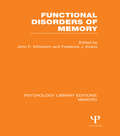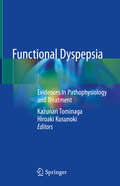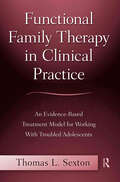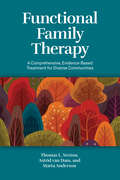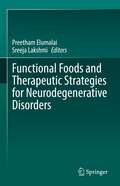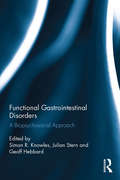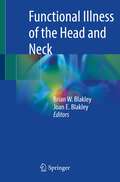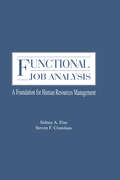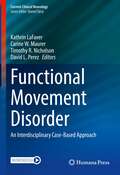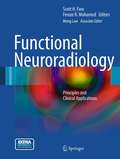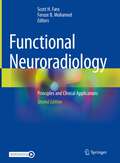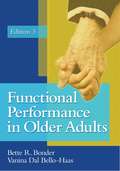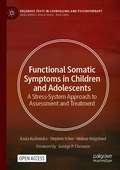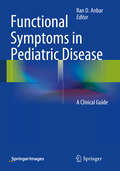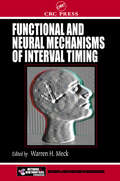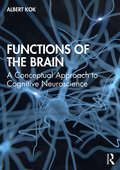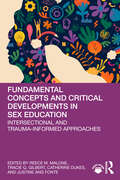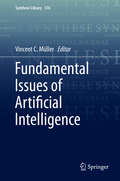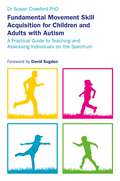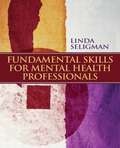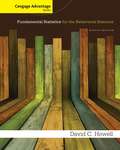- Table View
- List View
Functional Disorders of Memory (Psychology Library Editions: Memory)
by John F. Kihlstrom Frederick J. EvansOriginally published in 1979, the chapters in this volume summarize the available knowledge pertaining to a variety of functional – as opposed to explicitly organic – amnesias and disruptions of memory. Each chapter is written by an expert, and each author has attempted to integrate his area of inquiry into the contemporary body of theory and research on memory and cognition. Functional memory disorders may prove to be a significant testing ground for current theorizing, and the study of these phenomena may provide insights into memory and cognition that might be obscured in the usual sorts of laboratory investigations. The intent of the volume is to contribute to the development of a more comprehensive account of the processes involved in remembering and forgetting. The reader will find bold new treatments of repression and childhood amnesia, systematic explorations of certain experimental amnesias, and challenging analyses of the anomalies of everyday memory, in this ground-breaking work of the time.
Functional Dyspepsia: Evidences in Pathophysiology and Treatment
by Kazunari Tominaga Hiroaki KusunokiThe research and outcomes presented in this book gather evidence concerning both the pathogenesis and treatment of functional dyspepsia. It provides the latest information on this common non-organic disease, indicating its characteristic pathogenesis based on the brain-gut interaction and micro-environment and evidence gleaned from clinical treatment. Since the pathogenesis is associated with psychology, neurology, endocrinology and bacteriology in addition to gastroenterological physiology, it is often intractable and finding a suitable treatment rationale is challenging. Furthermore, the pathogenesis varies around the world and the efficacy of treatment using standard drugs varies among different populations worldwide; accordingly, this book highlights evidence gained in clinical trials in Japan. Functional Dyspepsia is a milestone produced by respected experts. Addressing unique topics and new findings of treatment including challenging and/or future rationales, it offers an invaluable resource for general clinicians, gastroenterologists, and basic researchers alike.
Functional Family Therapy in Clinical Practice: An Evidence-Based Treatment Model for Working With Troubled Adolescents
by Thomas L. SextonFunctional Family Therapy in Clinical Practice develops a comprehensive presentation that serves as a systematic guide to understanding the Functional Family Therapy (FFT) clinical model, the FFT service delivery system, the theoretical principles that serve as the foundation of FFT, and the mechanism of therapeutic change that gives FFT its potency. Clinically relevant, theoretically sound, and scientifically based, this book contains systematic discussions of topics and theoretical perspectives, as well as illustrative clinical examples that demonstrate the manner in which principles are applied in Family Focused Therapy.
Functional Family Therapy: A Comprehensive, Evidence-Based Treatment for Diverse Communities
by Dr. Thomas L. Sexton PhD Astrid van Dam Marta AndersonThis book details the history, science, and practice of Functional Family Therapy (FFT), an evidence-based model practitioners can use to understand families, the problems they face, and how to enable families to create real and lasting change. Functional Family Therapy (FFT) has evolved from a theory taught only in universities to become a treatment model implemented in more than eight countries and ten languages. It features specialized training, certification, and systemic fidelity processes that are used worldwide. FFT has been recognized in recent years as one of the premier evidence-based family intervention models for working with adolescents with problem behaviors. Chapters describe the evolution of the theory and extensive research support for FFT, provide overviews of each stage of treatment, and offer practical guidance for using FFT in a variety of contexts including juvenile and adult justice, child welfare, foster care, and behavioral health; using FFT in community contexts, including training and supervision and measuring and integrating client feedback; and using cutting-edge technological advances to better deliver optimal outcomes for families.
Functional Foods and Therapeutic Strategies for Neurodegenerative Disorders
by Preetham Elumalai Sreeja LakshmiThis book provides a comprehensive summary of the latest knowledge regarding functional foods and new therapeutic strategies for neurodegenerative disorders through explaining specific mechanisms for natural remedies and functional foods as well as alternative treatment and supplementary approaches for neurodegenerative diseases. Many relevant topics are covered, including role of prebiotics, recent applications for dietary polyphenols, marine bioactive compounds for neuro disorders, and age-related disorders. The roles of various remedies and functional foods are explained for various types of diseases, and the book also integrates the role of functional foods and remedies to work with the current therapeutics that are taking place. In parallel, the information presented through this book will also stimulate current status of leading contemporary methods for prohylactic and diagnostic practices, comprising nanoparticles, biomarkers, in silico techniques, and CRISPR-mediated genome editing–based therapy. The book will be essential reading for students and researchers with an interest in natural medicine, drug development, and food therapeutic strategies. In presenting new results and approaches and identifying areas for future research, it will also be of benefit for specialists in the field.
Functional Gastrointestinal Disorders: A biopsychosocial approach
by Julian Stern Simon R. Knowles Geoff HebbardThis book brings together world experts in the field of Functional Gastrointestinal Disorders (FGIDs) who practice an integrated and holistic approach in their care for patients to provide an up-to-date and comprehensive evaluation of a range of issues associated with the biopsychosocial treatment of FGIDs. Examining topics such as neurological and biological aspects of FGIDs, common concerns faced in relation to diagnosis, and ongoing medical decisions and interventions, each chapter provides crucial practical recommendations, as well as future directions of psychosocial work in multi-team environments. Functional Gastrointestinal Disorders considers individual conditions in detail, including the current Rome IV diagnostic criteria for FGIDs required to make a positive diagnosis, the role of psychological and other biopsychosocial and biofeedback aspects of treatment, and general recommendations with regard to diet and medications. Each chapter also provides an up-to-date consolidation and evaluation of the current literature as well as practical recommendations, which can then be applied by the reader in their own interaction with FGID patients. Topics covered include: the common concerns and issues faced by individuals with FGIDs in relation to pre-and post-diagnosis, ongoing medical decisions and interventions review of current evidence-based biopsychosocial treatment practices for each FGID condition the differences and challenges associated with FGIDs across individual life stages special topics such as the relationship with eating disorders and the role of psychotropic medications modern patient centred initiatives such as patient empowerment, distance and e-therapies the future challenges facing FGID treatment. Throughout the entire book, common themes and practical recommendations are described. Functional Gastrointestinal Disorders, has broad applicability across multiple spheres, including treatment, research and teaching and is accessible to those working in gastroenterology and primary care alike.
Functional Illness of the Head and Neck
by Brian W. Blakley Joan E. BlakleyThis book uniquely discusses an approach to illnesses for which the causes are unknown. It fills the gaps in the literature by relaying research on functional illness, identifying and assessing various options, and indicating some decision-making suggestions that should help clinicians and patients think about therapy. Special considerations for functional illness include “probability” explanations based on the experience of others, serious consideration of the severity of symptoms before treatments are applied, and balancing the risks, costs, and consequences of treatment; including the patient’s thoughts and attitudes is critical for success in treating functional illness. Unique and comprehensive, Functional Illness is an invaluable reference for medical physicians of all specialties who wish to understand better and identify functional illness symptoms.
Functional Job Analysis: A Foundation for Human Resources Management (Applied Psychology Series)
by Sidney A. Fine Steven F. CronshawThis book was written to address the need for timely, thorough, practical, and defensible job analysis for HR managers. Under continuing development over the past 50 years, Functional Job Analysis (FJA) is acknowledged by major texts in HR and industrial/organizational psychology as one of the premier methods of job analysis used by leading-edge organizations in the private and public sectors. It is unique among job analysis methods in having its own in-depth theoretical grounding within a systems framework. In addition to providing a methodology for analyzing jobs, it offers a rich model and vocabulary for communicating about the competencies (skills) contributing to work success and about the design of the work organization through which those competencies are expressed. FJA is the right theory and methodology for future work in an increasingly competitive global economy. This book is the authoritative source describing how FJA can encourage and support an ongoing dialogue between workers and management as they jointly pursue total quality, worker growth, and organization performance. It is a flexible tool, fully recognizing the rapid changes impacting today's organizations. It is a comprehensive tool, leading to an in-depth understanding of work, its results, and its improvement in a unique organization context. It is a humane tool, viewing workers in light of their full potential and capacity for positive growth. With FJA, workers and managers can work more constructively together in a wholesome and productive work relationship.
Functional Movement Disorder: An Interdisciplinary Case-Based Approach (Current Clinical Neurology)
by Kathrin LaFaver Carine W. Maurer Timothy R. Nicholson David L. PerezThis book is a practical manual for clinical practitioners seeking to take an interdisciplinary and multidisciplinary approach to the diagnosis and management of functional movement disorder (FMD). It discusses case vignettes, reviews the diagnostic approach, provides an update on available treatments, highlights clinical pearls and details references for further reading.Organized into three parts, the book begins with a framework for conceptualizing FMD - including its historical context, the biopsychosocial model and an integrated neurologic-psychiatric perspective towards overcoming mind-body dualism. Part II then provides a comprehensive overview of different FMD presentations including tremor, dystonia, gait disorders, and limb weakness, as well as common non-motor issues such as pain and cognitive symptoms. The book concludes with chapters on updated practices in delivering the diagnosis, working with patients and care partners to achieve shared understanding of a complex condition, as well as an overview of evidence-based and evolving treatments. Supplemented with high-quality patient videos, Functional Movement Disorder is written for practicing neurologists, psychiatrists, psychologists, allied mental health professionals, and rehabilitation experts with an interest in learning more about diagnosis and management of FMD.
Functional Neuroradiology
by Feroze B. Mohamed Scott H. Faro John T. Ulmer Meng LawFunctional Neuroradiology: Principles and Clinical Applications, is a follow-up to Faro and Mohamed's groundbreaking work, Functional (BOLD)MRI: Basic Principles and Clinical Applications. This new 49 chapter textbook is comprehensive and offers a complete introduction to the state-of-the-art functional imaging in Neuroradiology, including the physical principles and clinical applications of Diffusion, Perfusion, Permeability, MR spectroscopy, Positron Emission Tomography, BOLD fMRI and Diffusion Tensor Imaging. With chapters written by internationally distinguished neuroradiologists, neurologists, psychiatrists, cognitive neuroscientists, and physicists, Functional Neuroradiology is divided into 9 major sections, including: Physical principles of all key functional techniques, Lesion characterization using Diffusion, Perfusion, Permeability, MR spectroscopy, and Positron Emission Tomography, an overview of BOLD fMRI physical principles and key concepts, including scanning methodologies, experimental research design, data analysis, and functional connectivity, Eloquent Cortex and White matter localization using BOLD fMRI and Diffusion Tensor Imaging, Clinical applications of BOLD fMRI in Neurosurgery, Neurology, Psychiatry, Neuropsychology, and Neuropharmacology, Multi-modality functional Neuroradiology, Beyond Proton Imaging, Functional spine and CSF imaging, a full-color Neuroanatomical Brain atlas of eloquent cortex and key white matter tracts and BOLD fMRI paradigms. By offering readers a complete overview of functional imaging modalities and techniques currently used in patient diagnosis and management, as well as emerging technology, Functional Neuroradiology is a vital information source for physicians and cognitive neuroscientists involved in daily practice and research.
Functional Neuroradiology: Principles and Clinical Applications
by Feroze B. Mohamed Scott H. FaroThis new edition fully updates and expands Faro and Mohamed’s Functional Neuroradiology, a gold standard, comprehensive introduction to the state-of-the-art functional imaging in neuroradiology, including the physical principles and clinical applications of Diffusion, Perfusion, Permeability, MR spectroscopy, Positron Emission Tomography, BOLD fMRI and Diffusion Tensor Imaging. With chapters written by internationally distinguished neuroradiologists, neurologists, psychiatrists, cognitive neuroscientists, and physicists, Functional Neuroradiology is divided into 12 major sections, including: Diffusion and Perfusion Imaging, Magnetic Resonance Spectroscopy and Chemical Exchange Saturation Transfer Imaging, Multi-Modality Functional Neuroradiology, BOLD Functional MRI, Diffusion Tensor Imaging, Presurgical Brain Tumor Mapping, Emerging neuroimaging techniques, Functional Spine and Hydrocephalus imaging, and Neuroanatomical Gray and White matter Brain Atlases. This second edition is fully updated throughout and includes more than 15 new chapters on topics such as: Brain tumor Radiogenomics, CNS Tumor Surveillance and Functional MR Perfusion Imaging, CNS Machine Learning, Focused Ultrasound therapy, TBI Sports Related Injury, and CNS Lymphatic system. By offering readers a complete overview of functional imaging modalities and techniques currently used in patient diagnosis and management, as well as emerging technology, Functional Neuroradiology is a vital information source for physicians and cognitive neuroscientists involved in daily practice and research.
Functional Performance in Older Adults (Third Edition)
by Bette R. Bonder Vanina Dal Bello-Haas Marilyn B. Wagner Bette Bonder Vanina Bello-Haas"The contributors represent diverse disciplines, however their messages create a coherent, integrated work of universal interest and application. I highly recommend the use of this text for allied health students who are studying geriatric rehabilitation and for clinicians who wish to renew their knowledge. "--Carole Knight, MEd, OTR/L, Occupational Therapy in Health Care Journal, Volume 16, Number 2/3 February 2003, review of the 2nd Edition. The ideal resource for rehabilitation professionals who are working with or preparing to work with older adults! It describes the normal aging process, illustrates how health and social factors can impede an aging person's abilities, and demonstrates how to develop mechanisms for maximizing the well-being of older adults.
Functional Remediation for Bipolar Disorder
by Eduard Vieta Eduard Vieta Carla Torrent Anabel Martínez-Arán Carla TorrentManaging the cognitive difficulties experienced in bipolar disorder poses a significant challenge to patients, relatives, researchers and clinicians. This book equips readers with a thorough understanding of these cognitive deficits and, importantly, the usefulness of current treatment approaches, such as remediation, to improve functional recovery. This manual guides readers in the application of the Functional Remediation Program, providing a collection of materials enabling therapists to run group sessions. The first part focuses on cognitive deficits and their impact on functional recovery. The second part describes the operation of the program, session-by session, with reference to handouts and slides available for download from an accompanying website (URL. . . ). Topics covered include memory, attention, and executive functions. The final part describes the efficacy of this program, particularly the functional improvements seen in participants. An essential resource for psychologists, psychiatrists and other healthcare professionals caring for patients with bipolar disorder.
Functional Somatic Symptoms in Children and Adolescents: A Stress-System Approach to Assessment and Treatment (Palgrave Texts in Counselling and Psychotherapy)
by Stephen Scher Kasia Kozlowska Helene HelgelandThis open access book sets out the stress-system model for functional somatic symptoms in children and adolescents. The book begins by exploring the initial encounter between the paediatrician, child, and family, moves through the assessment process, including the formulation and the treatment contract, and then describes the various forms of treatment that are designed to settle the child’s dysregulated stress system. This approach both provides a new understanding of how such symptoms emerge – typically, through a history of recurrent or chronic stress, either physical or psychological – and points the way to effective assessment, management, and treatment that put the child (and family) back on the road to health and well-being.
Functional Symptoms in Pediatric Disease: A Clinical Guide
by Ran D. AnbarMany children with medical conditions fail to improve despite physicians' best efforts. Sometimes, we ascribe this failure to lack of adherence to therapy or to the severity of the condition. What we often fail to appreciate, however is that sometimes the lack of improvement can be explained by the patients' psychological states. The first section of Functional Symptoms in Pediatric Disease: A Clinical Guide teaches children's health care providers to recognize functional symptoms that can complicate organic disease as well as symptoms that are believed to be purely functional in origin. Literature reviews, case studies and quizzes are provided in each chapter, with video demonstrations included in some of the chapters. The second section of the book will help clinicians differentiate the patients for whom referral to a mental health provider is mandatory from those for whom other approaches may be useful. For the latter group, the book teaches clinicians to empower themselves by learning how to incorporate various therapies for functional disorders into their practice, including biofeedback, basic cognitive behavioral therapy techniques, hypnosis, acupressure, yoga and meditation. Practical strategies for obtaining training in these modalities are provided in the appendix. Useful for practicing clinicians including pediatricians, family practitioners, pediatric subspecialists, child psychiatrists, psychologists, other mental health care providers and practitioners of alternative and complementary medicine, Functional Symptoms in Pediatric Disease: A Clinical Guide is an important new book that will help children's health care providers consider the possible impact of functional contributions to the clinical presentation of their patients.
Functional and Neural Mechanisms of Interval Timing (Frontiers in Neuroscience)
by Warren H. MeekUnderstanding temporal integration by the brain is expected to be among the premier topics to unite systems, cellular, computational, and cognitive neuroscience over the next decade. The phenomenon has been studied in humans and animals, yet until now, there has been no publication to successfully bring together the latest information gathered from
Functions of the Brain: A Conceptual Approach to Cognitive Neuroscience
by Albert KokConsidering how computational properties of the brain inform cognitive functions, this book presents a unique conceptual introduction to cognitive neuroscience. This essential guide explores the complex relationship between the mind and the brain, building upon the authors’ extensive research in neural information processing and cognitive neuroscience to provide a comprehensive overview of the field. Rather than providing detailed descriptions of different cognitive processes, Functions of the Brain: A Conceptual Approach to Cognitive Neuroscience focuses on how the brain functions using specific processes. Beginning with a brief history of early cognitive neuroscience research, Kok goes on to discuss how information is represented and processed in the brain before considering the underlying functional organization of larger-scale brain networks involved in human cognition. The second half of the book addresses the architecture of important overlapping areas of cognition, including attention and consciousness, perception and action, and memory and emotion. This book is essential reading for upper-level undergraduates studying Cognitive Neuroscience, particularly those taking a more conceptual approach to the topic.
Fundamental Concepts and Critical Developments in Sex Education: Intersectional and Trauma-Informed Approaches
by Tracie Q. Gilbert Reece M. Malone Catherine Dukes Justine Ang FonteThis comprehensive resource equips emerging and experienced sexuality educators with contemporary frameworks for trauma-informed, equitable, and anti-oppressive education.It provides foundational principles for development and delivery, emphasizing inclusivity, accessibility, and intersectionality. Editors Malone, Gilbert, Dukes, and Fonte curate chapters by leading voices on topics such as historical perspectives, values, emotional intelligence, professional humility, reproductive justice, neurodivergence, sex work, kink, childhood and adolescent sexualities, faith-based education, social media, and entrepreneurship. Authors demonstrate decolonization, trauma-informed care, and equity in practice.With practical applications and reflective questions, this book is a vital guide for creating and teaching impactful, inclusive sex education for diverse audiences.
Fundamental Issues of Artificial Intelligence (Synthese Library #376)
by Vincent C. MüllerThis volume offers a look at the fundamental issues of present and future AI, especially from cognitive science, computer science, neuroscience and philosophy. This work examines the conditions for artificial intelligence, how these relate to the conditions for intelligence in humans and other natural agents, as well as ethical and societal problems that artificial intelligence raises or will raise. The key issues this volume investigates include the relation of AI and cognitive science, ethics of AI and robotics, brain emulation and simulation, hybrid systems and cyborgs, intelligence and intelligence testing, interactive systems, multi-agent systems, and super intelligence. Based on the 2nd conference on “Theory and Philosophy of Artificial Intelligence” held in Oxford, the volume includes prominent researchers within the field from around the world.
Fundamental Movement Skill Acquisition for Children and Adults with Autism: A Practical Guide to Teaching and Assessing Individuals on the Spectrum
by Susan Crawford David SugdenThis innovative manual sets out advice on fundamental movement skill acquisition (FMS) and its benefits for improving physical, verbal and social skills for people with Autistic Spectrum Disorder (ASD). Improving FMS can help prevent long term health issues, and increase opportunities for social engagement and independence. The book explores the basic skills of movement (running, catching, throwing, and balance) and how to observe, teach and assess FMS in children and adults with ASD. There are sections on how to develop and implement a programme for individuals to guide their personal development, and information on planning and tools for assessment are included. A much needed guide on how to combat impairment of FMS, the book also highlights the numerous benefits of such an approach in relation to behaviour, lifestyle, health and education.
Fundamental Skills for Mental Health Professionals
by Linda SeligmanThis book is intended to help students and novice clinicians, as well as more experienced clinicians, in the mental health professions of counseling, psychology, and social work to develop competence in the fundamental skills of their profession. With a solid grounding in such skills as effective use of questions, reflection of feelings, eliciting and modifying dysfunctional thoughts, and behavioral change strategies, clinicians can both acquire a sound understanding of their clients and develop strong helping skills.
Fundamental Statistics for Social Research: Step-by-Step Calculations and Computer Techniques Using SPSS for Windows
by Duncan CramerThis accessible introduction to statistics using the program SPSS for Windows explains when to apply and how to calculate and interpret a wide range of statistical procedures commonly used in the social sciences. Keeping statistical symbols and formulae to a minimum and using simple examples, this book:* assumes no prior knowledge of statistics or computing* includes a concise introduction to the program SPSS for Windows* describes a wider range of tests than other introductory texts* contains a comprehensive range of exercises with answersFundamental Statistics for Social Research covers SPSS Release 6 for Windows 3.1 and Release 7 for Windows 95. It will prove an invaluable introductory statistics text for students, and a useful resource for graduates and professionals engaged in research in the social sciences.
Fundamental Statistics for the Behavioral Sciences 8th Edition
by David C. HowellFUNDAMENTAL STATISTICS FOR THE BEHAVIORAL SCIENCES focuses on providing the context of statistics in behavioral research, while emphasizing the importance of looking at data before jumping into a test. This practical approach provides readers with an understanding of the logic behind the statistics, so they understand why and how certain methods are used--rather than simply carry out techniques by rote. Readers move beyond number crunching to discover the meaning of statistical results and appreciate how the statistical test to be employed relates to the research questions posed by an experiment. An abundance of real data and research studies provide a real-life perspective and help you understand concepts as you learn about the analysis of data.
Fundamental Uncertainty
by Roberto Scazzieri Silva Marzetti Dall’Aste BrandoliniThis volume addresses the subject of uncertainty from the point of view of an extended conception of rationality. In particular, the contributions explore the premises and implications of plausible reasoning when probabilities are non-measurable or unknown, and when the space of possible events is only partially identified.
Fundamentalism or Tradition: Christianity after Secularism (Orthodox Christianity and Contemporary Thought)
by Aristotle Papanikolaou and George E. DemacopoulosTraditional, secular, and fundamentalist—all three categories are contested, yet in their contestation they shape our sensibilities and are mutually implicated, the one with the others. This interplay brings to the foreground more than ever the question of what it means to think and live as Tradition. The Orthodox theologians of the twentieth century, in particular, have emphasized Tradition not as a dead letter but as a living presence of the Holy Spirit. But how can we discern Tradition as living discernment from fundamentalism? What does it mean to live in Tradition when surrounded by something like the “secular”? These essays interrogate these mutual implications, beginning from the understanding that whatever secular or fundamentalist may mean, they are not Tradition, which is historical, particularistic, in motion, ambiguous and pluralistic, but simultaneously not relativistic.Contributors: R. Scott Appleby, Nikolaos Asproulis, Brandon Gallaher, Paul J. Griffiths, Vigen Guroian, Dellas Oliver Herbel, Edith M. Humphrey, Slavica Jakelić, Nadieszda Kizenko, Wendy Mayer, Brenna Moore, Graham Ward, Darlene Fozard Weaver
